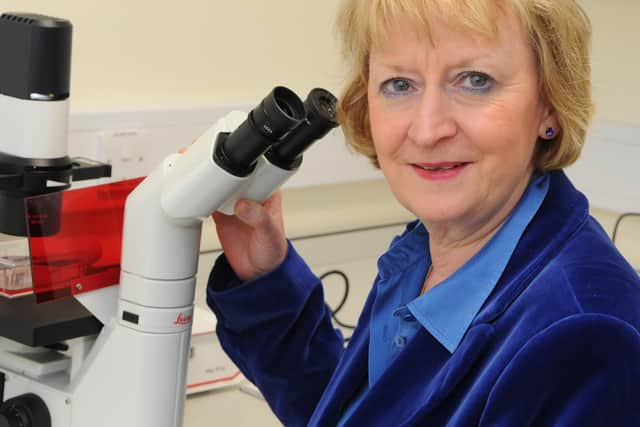Sheffield scientists set for £12million battle against infectious diseases including HIV
and live on Freeview channel 276
The National Institute for Health Research (NIHR) Sheffield Biomedical Research Centre (BRC) has been awarded the cash from the National Institute for Health and Care Research to accelerate scientific discoveries into new medical treatments.
The NIHR Sheffield BRC is a partnership between Sheffield Teaching Hospitals NHS Foundation Trust and the University of Sheffield dedicated to improving the treatment and care of people living with a range of conditions, including neurological disorders such as dementia, Parkinson’s disease, motor neurone disease and stroke. The new funding will allow scientists and clinicians to expand the centre’s pioneering research into areas such as infection, immune disorders and cardiovascular diseases in addition to neurology research.
Advertisement
Hide AdAdvertisement
Hide Ad

Previous NIHR funding has been used by NIHR Sheffield BRC to conduct 304 clinical studies, through which 2,974 patients had access to innovative experimental medicine treatments and therapies. The new funding will allow researchers to expand their investigations into other diseases such as cardiovascular disease and inflammatory and infectious diseases.
Over the next five years researchers will be working to improve early diagnosis for pulmonary vascular disease, care pathways for patients living with HIV, outcomes for cardiovascular disease patients, and develop new vaccines for infectious diseases. The centre will also apply the world-leading expertise of imaging researchers, engineers and data scientists at the University of Sheffield to harness the value of NHS data to understand disease prevalence in the region and improve disease prevention and health outcomes.
Prof Dame Pamela Shaw, director of the NIHR Sheffield BRC, said: “The Sheffield Biomedical Research Centre has a track record of giving access to experimental medical trials for patients living with a variety of diseases, including neurodegenerative diseases such as MND, Parkinson’s, and multiple sclerosis. This work has improved the outlook in multiple ways for patients facing devastating neurological conditions.
“The work of the new health-care themes includes breakthroughs in anti-platelet therapies for cardiovascular disease, innovative rehabilitation approaches for stroke victims, and life-changing biological treatments for severe inflammatory skin disease which have all significantly improved the lives of patients.
Advertisement
Hide AdAdvertisement
Hide AdHEALTH: Jessop Wing Sheffield: Cora Sinnott’s grieving family’s ‘Cora shaped hole that can never be filled’
“This new round of funding will allow the centre to continue this important work and develop a portfolio of promising new therapeutic approaches, as well as creating opportunities for the next generation of clinical and scientific researchers working to improve the lives of those living in South Yorkshire, a region that still suffers from lower life expectancy and wider health inequalities.”
Kirsten Major, chief executive of Sheffield Teaching Hospitals said: “ This means we can expand the ground breaking research we do in partnership with the University of Sheffield which impacts on the future care and treatment of so many patients not just locally but worldwide. The enlarged Biomedical Research Centre will allow even more of our patients to participate in research which we know in itself also improves patients’ health and outcomes.”
Research by NIHR Biomedical Research Centres has led to a number of ground-breaking new treatments, such as new gene therapies for haemophilia and motor neurone disease, the world-first treatment for Creutzfeldt–Jakob disease, a nose-drop vaccine for whooping cough, and the first UK-wide study into the long-term impact of COVID-19.

